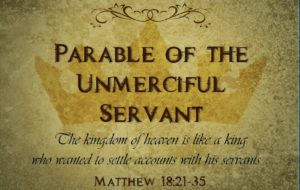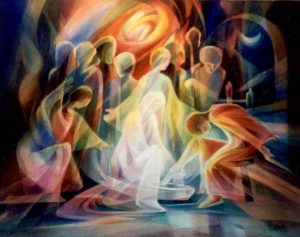This Representation of Forgiveness
Christ the Sinless One Forgiving Men
One of the most misunderstood teachings of Christ was the washing of the Apostles’ feet (Jo 13:5-20). Over the centuries many have argued for this ceremony to be included in church ordinances; however, Christ gave no such injunction. Christ did say we are to “wash each other’s feet” but not in actual washings. He was urging His Apostles, and us, to practice His metaphor, not perform His metaphor. Christ washing the feet of His Apostles was a metaphor of forgiveness which can only come from the Logos of God and each born from above person has the indwelling Logos of God (2Co 5:17).
Christ had spent three years teaching His Apostles that He was the Son of God; i.e., the visible manifestation of the Father who no one has ever seen. Thus, the night of their Passover meal the Apostles were shocked when Christ stripped down to the garb of a slave to wash their feet before the meal. In all religions {work-based systems} man knells before God(s) or suffers dire consequences. It was inconceivable to them that God should perform the menial work of a slave to them. Peter protested this reversal of roles only to be chasten by Christ proving once again that the Apostles were not clearly understanding Christ’s teachings. Just a few days earlier on the road from Jericho to Bethany James and John with their mother approached Christ asking for positions of power over all men, even the other Apostles. This vying for power, a manifestation of sin {covetousness}, threatened to destroy the unity of the group on the eve of Christ’s death. Christ performed this ceremony as a metaphor of forgiveness.
Christ is the visible manifestation of God in this physical material creation. In fact, He is the co-author of this creation including the creation of man (Ge 1:26-27; Jo 1:1-5). Thus, when man sinned, he sinned against the Son also; the very person who stood before them {hence the pure white representation of Christ in the above graphic}. The Passover was the annual representation of the sinless Son of God becoming sin to die in the place of sinful man to secure the forgiveness and salvation forever. Hence, forgiveness underlie all that Christ was preparing to perform; and the Apostles were unable to forgive each other for their petty sins of covetous ambition.

Christ Had Taught About Forgiveness
In the Parable of the Unmerciful Slave
Christ had taught the Apostles about forgiveness using the parable of the Unmerciful Slave. One slave had been forgiven a huge unplayable debt. This slave went out and accosted a fellow slave who owed him a tiny debt; since the fellow slave was unable to pay he was thrown into prison. When the master heard of this atrocity he called the numerical slave to him and threw him into prison for his unforgiveness. The moral: The master is Christ; the first slave is you and I who have sinned against God and are utterly unable to atone for our transgression; and the second slave is anyone who sins against us invoking our unforgiving sin nature. Hence, anyone who evidences an unforgiving nature is by definition not saved. Thus, the unforgiving person has condemned themselves by their own actions. Their lot: Lake of Fire.
Religions, work-based systems, do not teach true forgiveness. They may use the word but they cannot forgive since they do not have the Logos of God {new nature} within. The sin nature of man is utterly incapable of forgiveness. There may be a trade or exchange between individuals that passes for forgiveness. However, this is foreign to God’s Logos. God, against all understanding, gave Himself as a sinless sacrifice for sin obtaining forgiveness for those who are incapable of earning forgiveness. It is a gift from God (Ep 2:8). It is given, it cannot be earned. If forgiveness could be earned then Christ died for nothing.
The saved of men have God’s indwelling Logos, though in embryonic form. The life in the flesh is both a demonstration of God’s grace before the lost people of the world and a maturation process by which His people grow in the grace and maturation of Christ. This is principally demonstrated by the act of forgiveness. Thus, forgiveness is the manifestation of the fruits of the Spirit (Ga 5:22-23). God set us the example: He forgave what could not be otherwise obtained. Thus, we also are to forgive what otherwise could not be obtained. No one can undo the harm of sin. Once done, it cannot be undone. The sinful heart is unloving and unmerciful; thus, it can never forgive (Ro 1:28-32). However, the forgiven heart exhibits the Logos of God and forgives the unforgivable because God forgave us the unforgivable. Christ spoke of this early in His ministry in the famous, Sermon on the Mount (Mt 5-7). Christ said that those who cannot forgive others will themselves not be forgiven of God because they do not the nature of God; i.e., not saved. Indeed, the Lord’s Prayer in this same sermon gave us the example prayer illustrating that one’s forgiveness from God is tied to our forgiveness of others.

Forgiveness is not given to earn
God’s Forgiveness; it is just given
Christians forgive, not earn forgiveness from God, but because it is now our nature to forgive just as it is God’s nature to forgive. Thus, on His last night Christ believed this message of forgiveness so vital that He gave a metaphorical demonstration to His Apostles. John remembered it and it formed the foundation of his teachings that Christians, though forgiven, still sin (1Jo 1:8-10). Christians should not fall into the trap of believing that God’s initial salvation forgiveness prevents us from ever sinning. While we remain in these bodies of flesh we continue to sin because we only dimly grasp the clear message of Christ (1Co 13:12). Yet, once we receive out new bodies we will clearly know the full Gospel even as Christ already completely knows each of us.
Today there exists a political and social climate of unforgiveness. Palestinians cannot forgive the Jews who cannot forgive the Palestinians. This violent Muslim adherents cannot forgive non-Muslims who in turn fear the violent Muslim adherents and cannot forgive in return. The Democratic fringe cannot forgive the Republican fringe and vice versa. The result demonstrates the works of the flesh: violence upon violence upon violence. the cycle of violence cannot be broken except through forgiveness; yet, the lost cannot forgive. Thus, the entire world sinks into a violent morass awaiting a false messiah who promises to end the violence by peace through force; a slogan touted ad nauseam during the bloody 20th century. The price of unforgiveness: blood, rivers of blood via the myth of peace.

